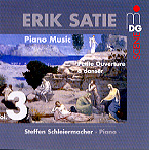Little of Satie’s irony and caustic charm comes through pianist Steffen Schleiermacher’s generally austere and serious-minded interpretations. At least the Sarabandes proceed at their intended tempos, while by contrast the Gnossiennes sound as if they’ll never end. The notes drip out like leftover water in an abandoned rusty drain; sometimes they’re overpedalled or irritatingly hammered out. More slow-motion torture occurs in the Pièces Froides. They’re not “cold” under Schleiermacher’s fingers, but rather frozen solid, boasting a dynamic range from loud to louder.
But the main problem with Schleiermacher’s Satie is that he blurs distinctions that exist between each individual work and makes them all sound alike (quite the opposite of Jean-Yves Thibaudet and Aldo Ciccolini). As such, this disc is good to play at a low volume while getting a massage. But don’t use it for background music to accompany a relaxing hot bath, because you’re likely to fall asleep in the tub and drown.
































